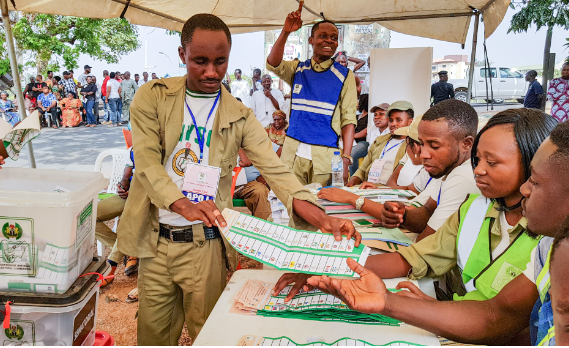
On Saturday, Nigerians will go to the polls to choose a president to succeed President Muhammadu Buhari. Many are hoping that the new president would set a new course for the continent’s most populous country and largest economy following years of escalating violence and misery.
Two political veterans from the two major parties and a candidate from a minor party who polls indicate has a chance due to backing from young people are the key contenders in the most competitive race since Nigeria moved from army rule to democracy in 1999.
YOU MAY ALSO LIKE: EFF Members Kicked Out Of KZN Legislature After Scuffle With Security (Pics)
After promising to restore peace and security throughout Nigeria, Africa’s largest oil producer, Buhari, a retired army general, is stepping down after serving the maximum eight years permitted by the constitution.
More than 93 million people have registered to vote for the National Assembly and the next president, and there will be 176,600 polling stations open from 8:30 am to 2:30 pm.
As soon as polls close, results will start to be tallied and posted outside of polling places. Within five days after the election, the final results from the 36 states and the federal capital Abuja are anticipated.
A senatorial candidate was assassinated on Wednesday in the volatile southeast region of Nigeria, the latest in a string of violent events that have tarnished the lead-up to the vote. This pattern of violence was observed in past elections in Nigeria.
The election takes place as Nigerians struggle to deal with a cash scarcity brought on by a bungled effort to exchange old bank notes for new ones. This has disrupted people’s daily lives and resulted in violent situations at banks and ATMs.
THREE PRIMARY PARTICIPANTS
Former Lagos governor Bola Tinubu, 70, of the ruling All Progressives Congress, former vice president Atiku Abubakar, 76, of the main opposition Peoples Democratic Party, and former Anambra state governor Peter Obi, 61, of the smaller Labour Party, are the leading candidates in the race to succeed Buhari.
Political heavyweights Tinubu and Atiku, as he is called in Nigeria, have extensive networks and large campaign finances. Tinubu is a Yoruba of Muslim ancestry.
YOU MAY ALSO LIKE: Zondo: “The Judiciary Will Not Be Intimidated”
Despite having a smaller political machine behind him than other candidates, Obi, an Igbo Christian, has employed a clever social media campaign to inspire a lot of enthusiasm among young voters. Some of his supporters even go by the name “Obidients.”
Although electoral violence and fraud have a long history in Nigeria, recent elections have seen a steady improvement. On Wednesday, the parties and contenders for president vowed to support an orderly and open election.
The Bimodal Voter Accreditation System (BVAS), which will identify voters using biometric data, is one of the new technologies and procedures that the Independent National Electoral Commission (INEC) claims it has implemented to ensure this election is free and fair.
Analysts have cautioned that there are still concerns associated with the lack of funds, which may leave cash-strapped individuals open to vote-buying by candidates, and the lack of fuel, which may make it difficult for INEC to move personnel and equipment to all locations.
On Thursday, US Vice President Joseph Biden urged candidates and parties to accept the election results as declared by INEC. He also urged all Nigerians, particularly young voters, to cast their votes.









